The American Dental Association featured the amazing story of a UMKC dental student who delivered a baby
Aliah Haghighat had just finished prepping her patient’s tooth before a restoration and was about to get the lead doctor to inspect her work, when her patient tells her something shocking. This story was also picked up by Becker’s Dental Review. Read the ADA story.
Nov 29, 2019
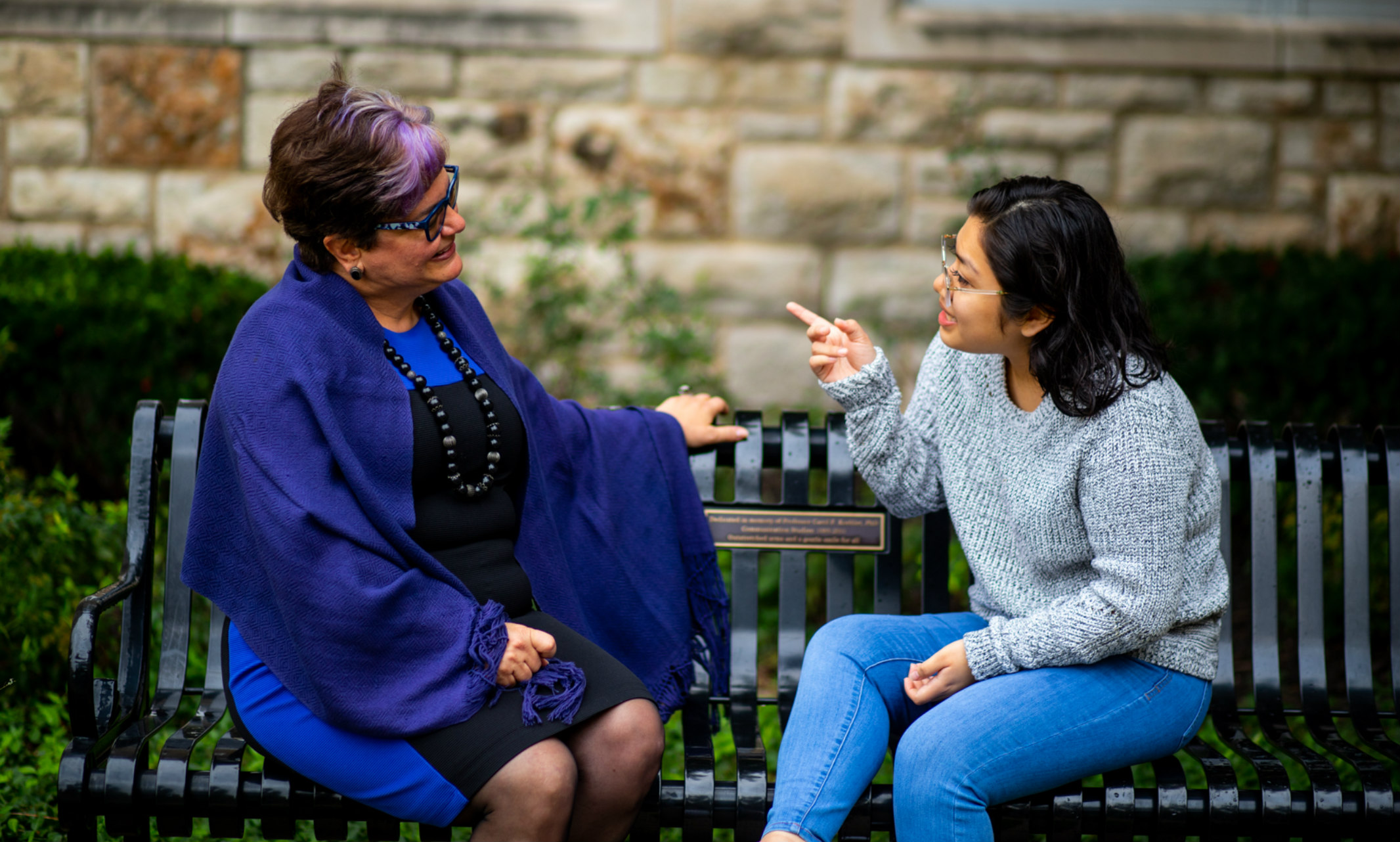
Mentor in the UMKC Avanzando program assists in journey
The heart of UMKC is our campus community. With lots of opportunities, it’s easy to develop student mentorship teams. And these rich relationships—our Dynamic Duos—are some of our best success stories.
When Aricela Guadalupe first arrived at UMKC, she spent a lot of time thinking about her parents - would she make them proud? Would she have what it takes to succeed in college?
As a first-generation college student, she was eager to take advantage of the opportunity she’d been given. But the path to graduation seemed uncertain.
“It was honestly scary, because you don’t know what to expect,” she says. “You doubt yourself. ‘Am I going to be able to do it? Am I doing this right?’ You don’t want to mess up.”
Guadalupe’s parents immigrated to the United States from a small Mexican village. Growing up, their main concern had been getting food on the table, not filling out college applications or studying for exams. They came to the U.S. so their children would have opportunities they’d never been able to aspire to.
Now, Guadalupe was living the dream her parents always wanted for her, but the transition to college was intimidating. Thankfully, she had an important resource to turn to: She was a member of the Avanzando program, which offers academic support and mentoring to Latinx students.
“It’s such a joy. It’s such a rewarding experience. And it’s a way of paying back all the opportunities I have had in life. If I hadn’t had mentors, I wouldn’t have come as far as I have.” - Clara Irazábal-Zurita
Through Avanzando, Guadalupe was connected with Clara Irazábal-Zurita, director of the Latinx and Latin American Studies Program and a professor in the Department of Architecture, Urban Planning + Design. Irazábal-Zurita quickly became a trusted friend and advisor, never more than a few buildings away on campus.
When asked how a mentor can help a student, especially a first-generation student like Guadalupe, Irazábal-Zurita’s answer is simple: They can help “with everything.”
“We’re here to be friends, to be companions in their journey of education, of growing up in general and maturing as people,” she says. “It is important that students have an opportunity to chat with others who can guide them through the experience, and sometimes even vent with the frustrations that come naturally with that process of growth.”
For Guadalupe, knowing she has a friend and advisor just a call, text or email away has made the college experience a lot less scary.
“I just know she’s there, that I have someone to go to to ask for guidance and advice,” she says. “I know I have someone to talk to.”
Guadalupe, a business administration major with an emphasis in management, says her goals for the future are to graduate from college and begin a career she likes, whatever that may be. She is also learning more about her history and culture as a Latinx and Latin American Studies minor.
She dreams of owning a business of her own someday, but for now, she’s happy with what she’s pursuing at UMKC: studying, networking and meeting new people in groups like Avanzando and the Latinx Student Union.
“I just know she’s there, that I have someone to go to to ask for guidance and advice. I know I have someone to talk to.” - Aricela Guadalupe
Her advice for future students? Don’t be afraid to put yourself out there or ask for help.
“Don’t be scared. Just talk to people,” she says. “Because everyone is going through the same thing. You never know, maybe they’re scared to make friends, too.”
Irazábal-Zurita also has a message, but for the parents and families of new college students.
“Instead of advice, I would want to congratulate families in general, and Latino families in particular, because they invest a lot in supporting their children to come to college and to do well in college,” she says. “Keep doing what you’re doing and realize that this is an investment for the long term.”
Mentoring students like Guadalupe, she says, is just as beneficial for her as it is for the students.
“It’s such a joy. It’s such a rewarding experience,” she says. “And it’s a way of paying back all the opportunities I have had in life. If I hadn’t had mentors, I wouldn’t have come as far as I have. I wouldn’t be where I am today. It’s very important for me to help out - to be that building stone for others who come behind me.”
Learn more about the Latinx and Latin American Studies Program
Nov 26, 2019
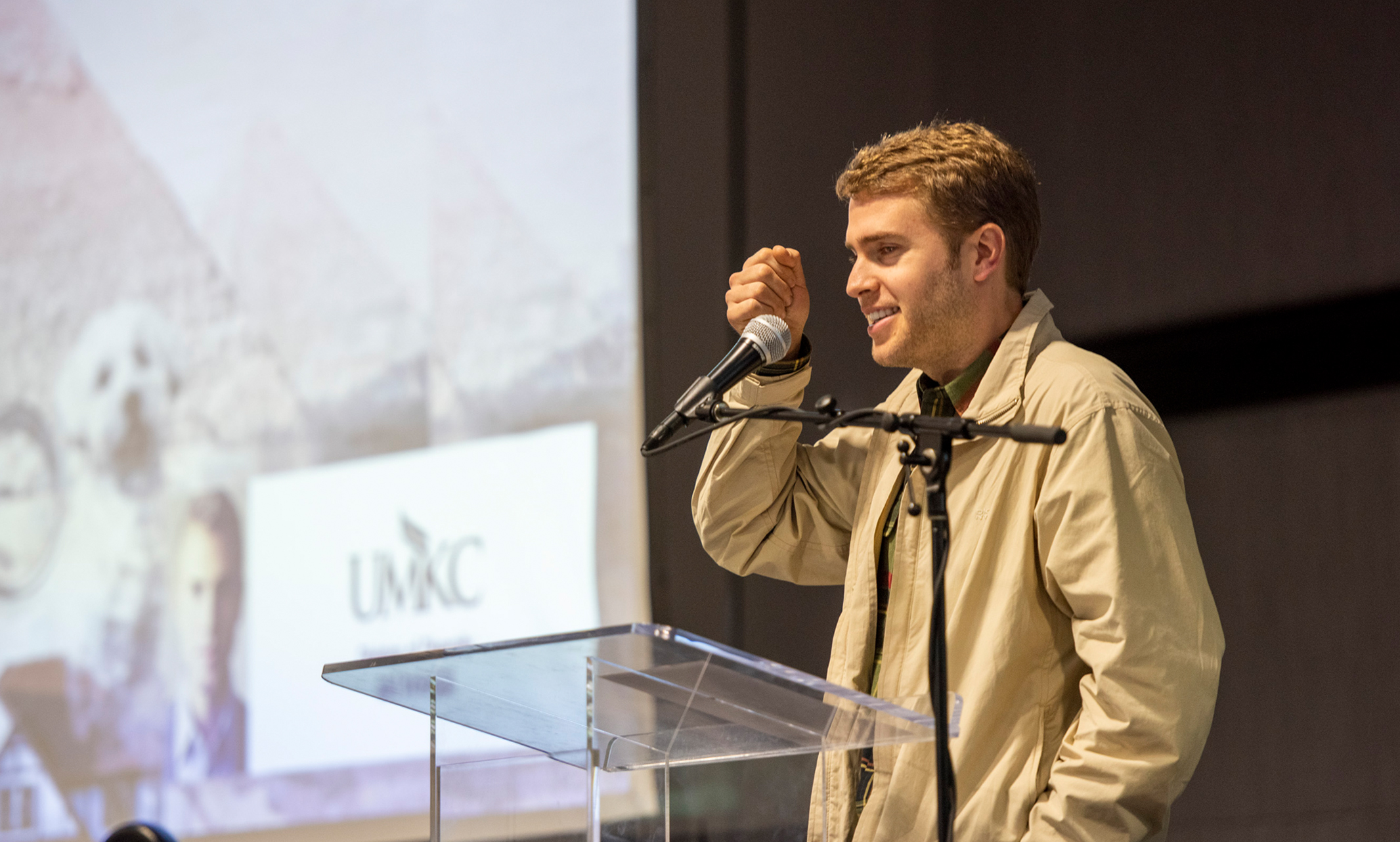
Shane Bitney Crone’s story is the topic of a documentary
Shane Bitney Crone was banned from the funeral of the love of his life. He went unmentioned at the ceremony and in the obituary. His partner’s family turned on him because he was the other half of a loving, committed gay couple. Crone shared his sorrow and ongoing recovery at the 13th annual UMKC Pride Lecture Nov. 21.
For Crone, telling his story is hard. But necessary, he said.
“It is so important that we have these conversations and share these stories, because it’s in telling these stories that we open people’s hearts and minds,” he said.
Crone and his partner, Tom Bridegroom, had been living together for more than five years when Bridgegroom fell to his death from a rooftop in 2012 while seeking a better angle for a photograph. As a couple, they traveled the world, started a successful business and promised to get married when it would be recognized by the federal government.
After the fall, Crone was initially not permitted to enter Bridegroom’s hospital room, though sympathetic hospital staff eventually ignored the rules and let him in. Bridegroom’s family had all the legal rights to his body, property and services. They shut Crone out completely, refusing to even tell him the day, time and site of the funeral.
On the one-year anniversary of Bridegroom's death, Shane uploaded a video to YouTube called "It Could Happen to You." His goal was to demonstrate that common humanity that we all share. The video went viral within a matter of days and has since been viewed more than 20 million times on social media.
“It is so important that we have these conversations and share these stories, because it’s in telling these stories that we open people’s hearts and minds.”
Hollywood producer Linda Bloodworth-Thomason was inspired by the video and approached Crone about turning his story into a feature-length documentary. The film, “Bridegroom: A Love Story, Unequaled,” premiered at the 2013 Tribeca Film Festival where it was introduced by former President Bill Clinton.
Today, Crone travels the world to show the film and, more importantly, ignite conversations that he hopes will lead those prejudiced against the LGBTQIA community to open their hearts and minds to think in different ways.
After showing the film, Crone took questions from the audience. One asked how he managed to pick up the pieces of his life following that painful tragedy.
“That first year was dark,” Crone responded. “I reminded myself what Tom would have wanted, and he would not have wanted me to stay in that space.”
In the seven years since Bridegroom’s death, Crone has become a speaker and activist, and found a new love. He’s now engaged.
“I want to think that Tom would be happy for me.”
Nov 25, 2019
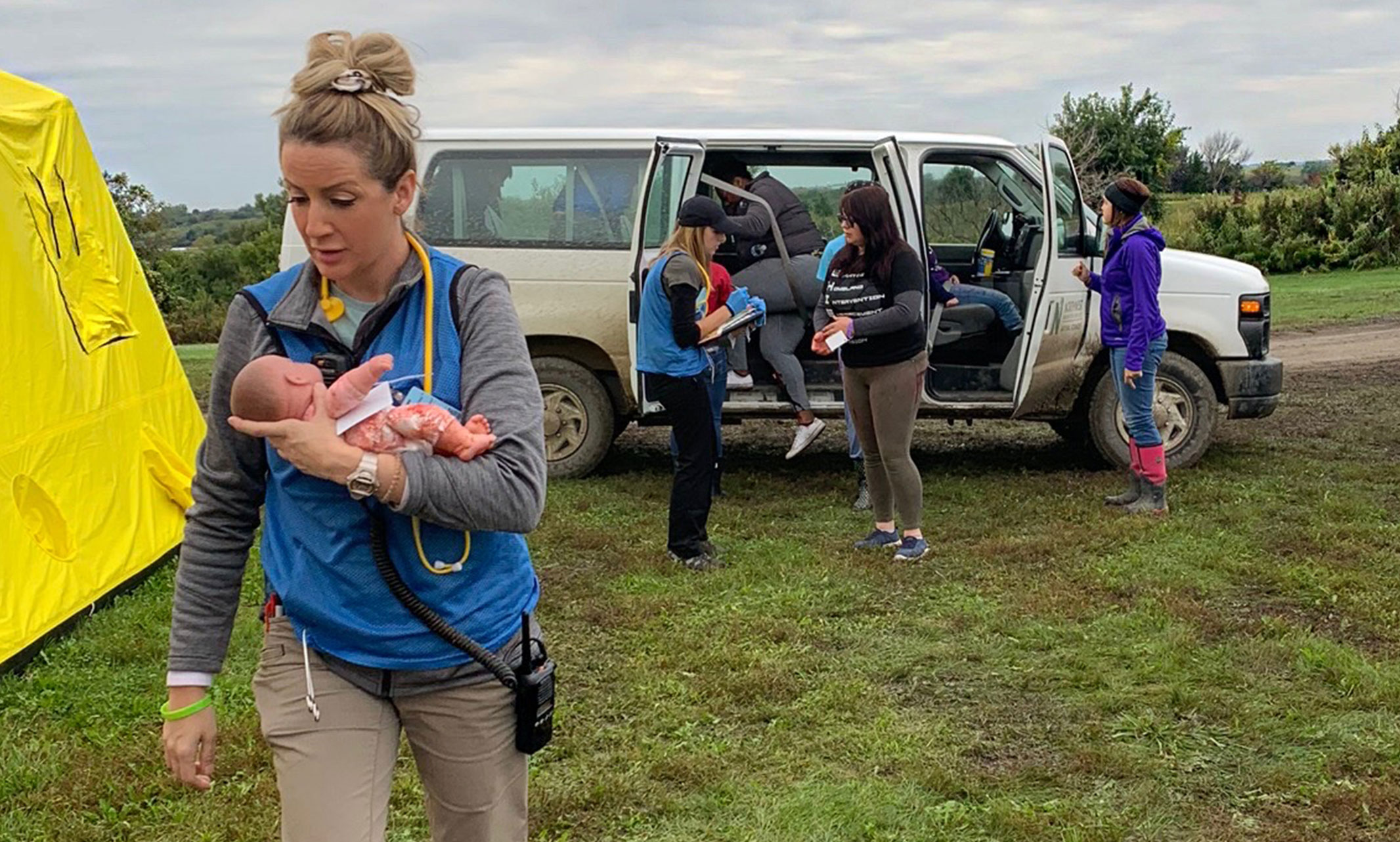
Large-scale emergency preparedness event held in Missouri
For Julie Miller, treating 65 patients in three hours in a makeshift medical tent really brought home the importance of being prepared when faced with the unexpected. Miller, a UMKC nursing student, recently participated in Missouri Hope, a national emergency preparedness event held each year at Northwest Missouri State University in Maryville.
Presented by the Consortium for Humanitarian Service and Education, the $2.4 million immersion exercise prepares students and professionals to manage a community’s needs when disaster strikes. Complete with patient actors, students are challenged with emergency scenarios including a water rescue and several mass casualty situations. They also participate in a high-ropes course, designed to help train for patient transports when steps or elevators are unavailable due to building damage or power outages.
Sharon White-Lewis, an assistant professor at UMKC, led a group of 16 students during Missouri Hope, which spans four days and three nights. UMKC was one of two nursing schools in the country providing student participants, who were joined by members of the military, homeland security, fire fighters and police.
“The Missouri Hope exercises are the only immersive exercises that train students to prepare for our worst days,” said White-Lewis. “Nurses deployed to these disasters are thrust into circumstances facing devastating destruction, dangerous situations and ethical dilemmas, all while trying to help survivors with severely limited resources and personnel. As the world keeps facing both man-made and natural disasters, our UMKC graduates will be prepared.”
According to Miller, at the time the opportunity was presented, there has been a deluge of natural disasters in the news. “A string of tornadoes and hurricanes had just happened, and I would sit and think, I wished there was something I could do that would be helpful.”
Missouri Hope was the answer.
The UMKC Nursing and Health Studies Alumni Board also saw the importance of this experience and offered its support. Because disaster simulations require supplies students normally wouldn’t have – such as disposable stethoscopes, duct tape and mylar blankets – the board stepped in and provided funding to acquire these items for the students.
By design, participants aren’t given a great deal of prep or lead up before the exercise, said White-Lewis, as organizers want to stay as close to the reality as possible. But she does provide students training in a few care techniques that are unique to emergency situations: makeshift gurneys and wound coverage, improvised splints and emergency triaging.
Miller said triage is particularly hard on health-care providers as it goes against everything they’re taught. For example, in a hospital, nurses work to make sure patients have all the care needed to get back in good health. But in an emergency, it’s a judgment call on how much time to spend on each patient.
“When you’re out at a disaster and there are 50 victims in a field, you have to figure out how you can do the most good for the most amount of people,” said Miller. “On the spot, you have to perform a rapid assessment and decide if you can help that person or not and sometimes, you have to make hard decisions.”
“With 3 million nurses in the United States alone, the more nurses that know what to do in a disaster, the more we maximize our ability to save lives. It’s as simple as that.” - Sally Ellis Fletcher
Miller says the exercise felt like a real disaster from the moment it began. She compared it to her experience in the UMKC patient simulation lab, where students interact with high-tech mannequins. While that offers valuable learning, it can feel artificial and require a bit of acting, she says. But at Missouri Hope, there was no feeling of having to act, as she treated every patient with the immediacy of an actual disaster.
The Consortium for Humanitarian Service and Education sponsors two other Hope initiatives – one in New York and one in Florida. All three provide unique disaster scenarios that would apply to that particular geographic area. Last year, UMKC students and faculty took part in both Florida Hope and New York Hope, and the school plans to continue that effort.
Sally Ellis Fletcher, associate dean of students at the school is a strong advocate for disaster preparedness opportunities for students. She believes these experiences will have lasting effects. “Disasters aren’t planned; they can happen anywhere or at any time,” she said. “With 3 million nurses in the United States alone, the more nurses that know what to do in a disaster, the more we maximize our ability to save lives. It’s as simple as that.”
Learn more about the School of Nursing and Health Studies
Nov 20, 2019
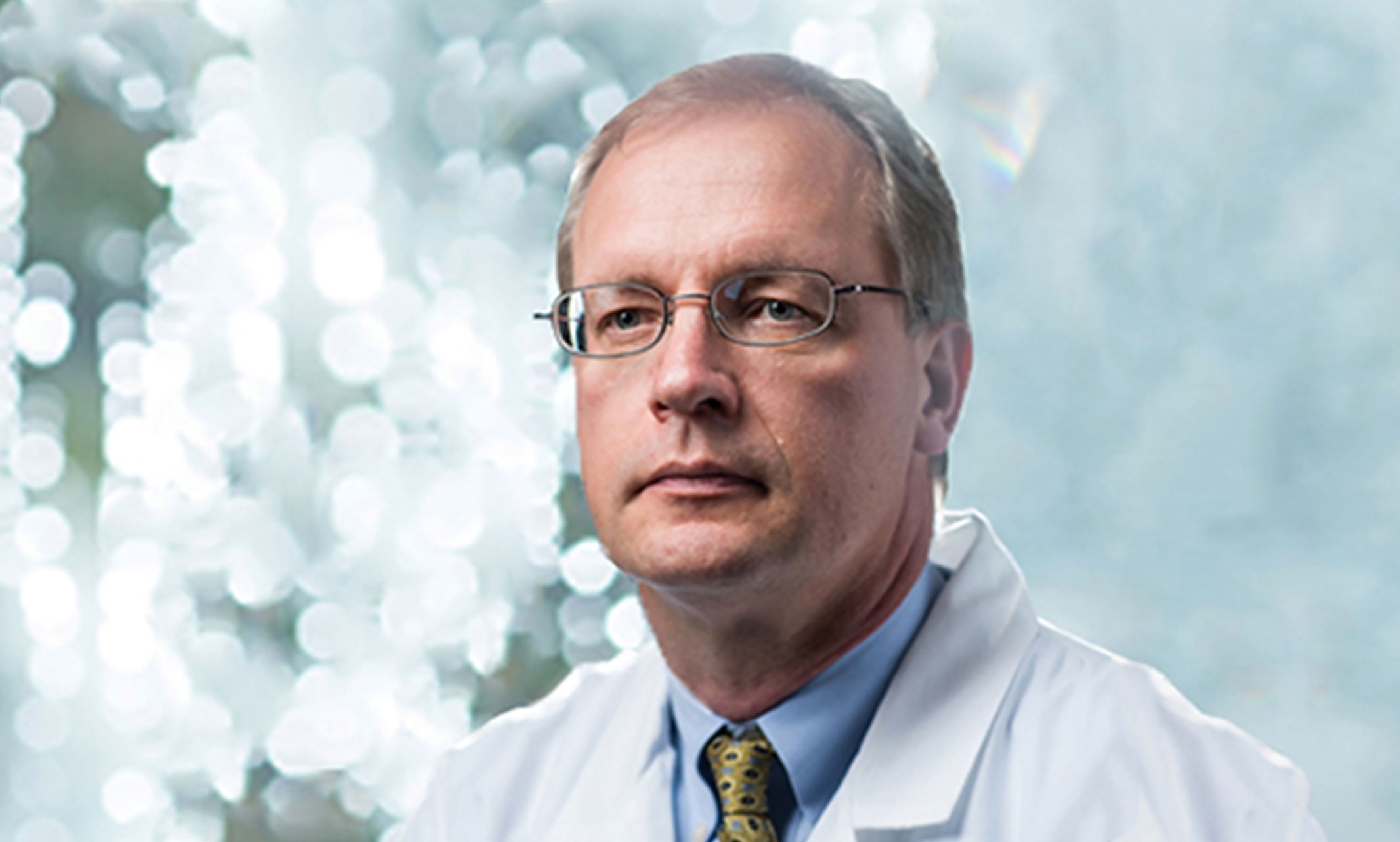
Peter Koulen is part of $1.5-million NIH grant working on novel tissue-preservation method
Surgeons around the world currently perform more than 240,000 corneal transplants a year to address a wide range of eye diseases. Researchers and physicians, however, estimate as many as 10 million patients could benefit from the procedure if enough viable tissue was available.
The University of Missouri-Kansas City Vision Research Center is part of a $1.5-million National Institutes of Health grant-funded project exploring the capability of a novel, ultra-fast technique of cryopreservation — the use of extremely low temperatures to preserve living cells and tissues — that could help meet those far-reaching clinical needs in ophthalmology and a number of other fields of medicine.
The NIH awarded a grant to CryoCrate, a Columbia, Missouri-based company active in biomedicine working with the University of Missouri-Kansas City Vision Research Center. The new two-year award is for $1.5 million and includes a subcontract of $722,870 to the UMKC Vision Research Center. It is a follow-up NIH grant for earlier collaborative work between CyroCrate and UMKC.
With current techniques, many types of cells and tissues, including cornea tissues, cannot be preserved at all or lose their function when subjected to the freeze-thaw process of cryopreservation. Peter Koulen, Ph.D., professor of ophthalmology, endowed chair in vision research at the UMKC School of Medicine and director of basic research at the UMKC Vision Research Center, and Xu Han, Ph.D., president and chief technology officer of CryoCrate, jointly developed a new cryopreservation technique to preserve the viability and functionality of cornea and bioartificial ocular tissues. This new phase of funding will allow Han and Koulen to extensively test and refine the technology before taking it to the clinics.
So far, traditional methods of cryopreservation have been unsuccessful to preserve and store human corneas for use in patients because cells critical for cornea function are lost during freezing. Corneas need adequate numbers of such cells to be present and properly functioning in the grafted tissue for the surgery to be successful. This currently limits storage of corneas to refrigeration, which is insufficient in delaying the deterioration of cornea tissue beyond a few days and creates numerous clinical challenges shared by other areas of transplantation.
CryoCrate is headquartered at the Missouri Innovation Center. It commercializes a new cooling method that better preserves tissue in a frozen state with only negligible mechanical damage to the tissue. The technology is co-developed and co-owned by CryoCrate and UMKC. It also eliminates the need for so called cryoprotectants, chemicals that facilitate successful recovery of live tissue from freezing, but pose a range of medical and regulatory challenges. International patents pending and patents by CryoCrate and UMKC protect the technology and will enable CryoCrate and Koulen’s team at UMKC to address the urgent worldwide clinical needs and rapidly evolving fields of transplantation medicine.
The new funding allows Han and Koulen to further develop an upgraded system that is equally effective in the cryopreservation of whole corneas and large bioartificial tissue. This would enable long-term storage of the tissues and could make them more readily available when and where needed for clinical use and research.
Early tests at the UMKC Vision Research Center detected no statistical difference in the number and quality of the cells that determine cornea health and function when comparing corneas cryopreserved using the new technology with fresh cornea tissue. This level of efficiency in preserving corneal tissue has not been achieved before with traditional corneal cryopreservation techniques.
If further tests prove to be equally effective, the goal is to introduce the new cryopreservation products for clinical use in patients following completion of the new grant and regulatory steps of product development.
Nov 20, 2019
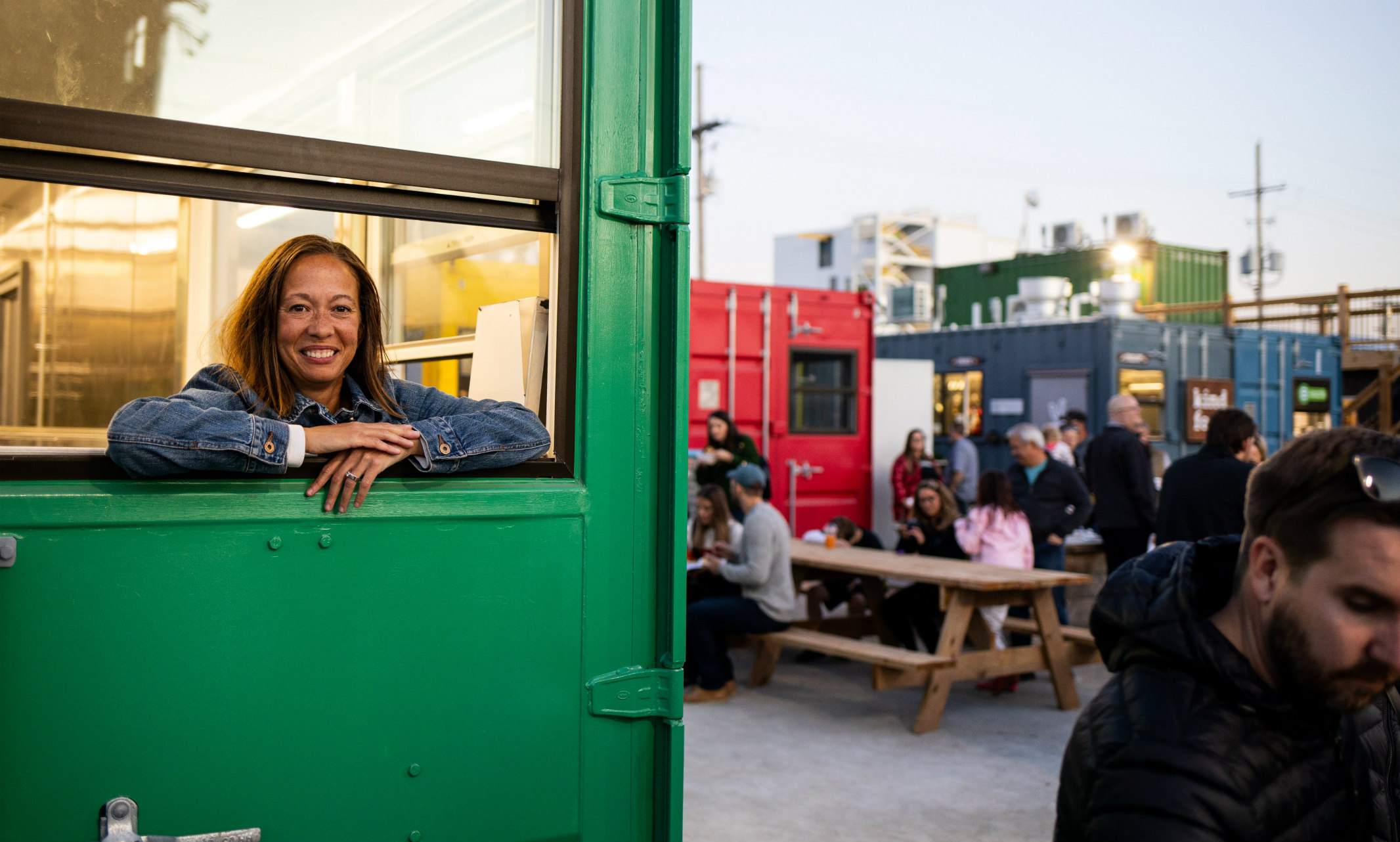
Rachel Kennedy Cuevas founded Iron District, an innovative dining and retail court made of shipping containers
Big things come in small packages. Rachel Kennedy Cuevas’ new business development is proof of the proverb.
Cuevas (B.B.A. ’98) is the brains behind Iron District, a new restaurant-retail destination made of 18 shipping containers in an industrial neighborhood at 16th and Iron in ever-growing downtown North Kansas City. The container park is a rare hybrid of two popular fast-casual dining concepts: food trucks and food halls.
Cuevas takes a small group on a tour of the containers, where red, green, yellow and blue boxes — some double-stacked — form a rectangle where picnic tables are arranged inside the center forcommunal eating.
“There’s not much like this in the U.S. except in Las Vegas,” Cuevas says. “And the businesses there are mostly bigger brands.”
The Iron District containers — including one with a rooftop bar — offers plenty of home-grown eating and beverage options to choose from: vegan, ice cream, coffee and even an avocado bar. And it’s her own Cuban fusion restaurant, Plantain District — originally a food truck — that led to the Iron District in the first place.
Cuevas founded Plantain District after eating a Cuban sandwich with her husband, Yvan Cuevas (B.B.A. ’98, MBA ’00), who had lived in Cuba. The two met while they were students at the Bloch School of Management. After taking a few bites, she had a revelation: “I can make something better.”
“The food truck thrived because I had the business education and hired chefs to do the cooking — a recipe for success,” Cuevas says. “UMKC, through the Bloch School, gave me the business background, and that’s why I’m now a developer working with other entrepreneurs.”
After its creation in 2014, Plantain District motored along swiftly, catering at food truck rallies, corporate events and weddings. But the nature of the business made Cuevas anxious: a livelihood based on an expensive kitchen that could be sidelined by a flat tire.
“It means collaborating with others. It means fostering a community, which is one of my favorite parts of business.” — Rachel Kennedy Cuevas
Though her fears never played out, they led to the Iron District concept. The size of shipping containers are roughly the same dimensions as food trucks and don’t include the threat of engine failure. She pitched the concept to North Kansas City leaders and was greeted with enthusiasm.
“It means collaborating with others,” Cuevas says. “It means fostering a community, which is one of my favorite parts of business.”
After more than two years of working on the container park, Iron District finally opened in October 2019. Vivid art murals greet customers from the sides of the containers, along with a diversity of culinary options. Cuevas fervently talks about future plans, including adding walkways between containers.
Cuevas considers Iron District a proof-of-concept incubator for startups. The restaurants and businesses, including clothing boutiques and a wellness center with a rotating schedule of yoga and massage practitioners, have short-term leases. One container is devoted to conference space and can be rented hourly to entrepreneurs for meetings.
“If any businesses outgrow their space, I’ll consider that a win,” Cuevas says. “It means they can attribute some of their success to what we’ve built at the Iron District.”
This story orginally appeared in Perspectives magazine, vol. 29.
Nov 20, 2019
David Van Horn, associate chemistry professor, talked to KSHB about rock salt variations that are harmful to pets and the environment
“When you go to the store, you will now find a magnitude of products. Some get down to different freezing levels...typically any salt [sodium chloride] will work. Some are touted as being more environmentally safe or pet friendly, so those are with calcium chloride or magnesium chloride as their ingredients,” David Van Horn, associate chemistry professor at University of Missouri-Kansas City, explained. More.
Nov 20, 2019
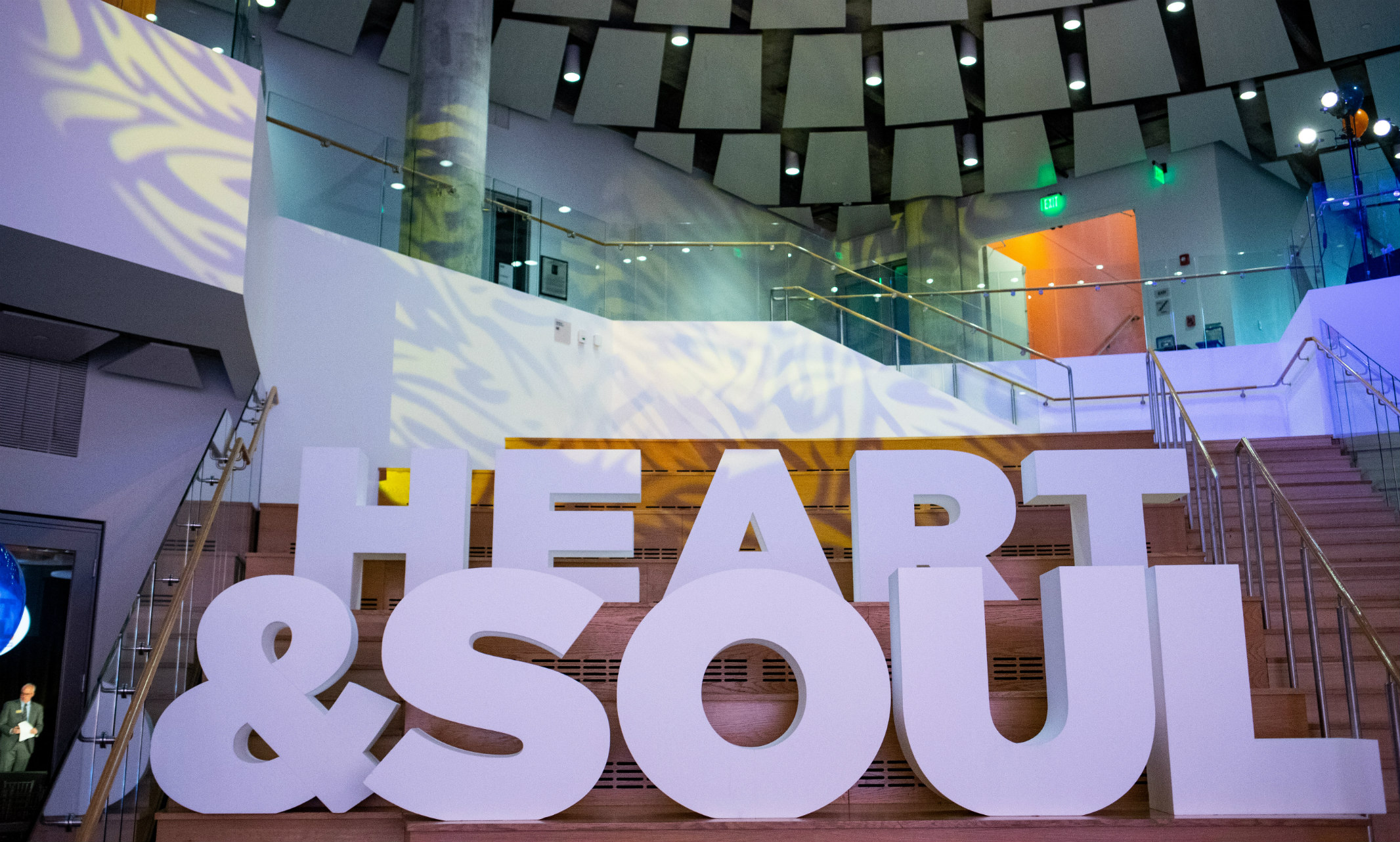
34th annual celebration recognizes Cerner founders and Kansas City leaders
“Everything that Henry touched was heart and soul first,” said Roasterie founder Danny O’Neil in a warming tribute to the late Henry W. Bloch.
That’s just one of the many lessons Bloch shared with a community of entrepreneurs who sat at his feet and sought his wisdom. And, in true Henry Bloch fashion, the 34th Entrepreneur of the Year Awards, hosted by the UMKC Henry W. Bloch School of Management, was celebratory of the collaborative work it takes to turn dreams into reality.
“In the past few years, we’ve been saying ‘let’s make Kansas City America’s most entrepreneurial city,’ and we’ve worked together to make that happen,” said UMKC Innovation Center Director Maria Meyers, the Marion and John Kreamer Awardee for Social Entrepreneurship. Meyers founded KCSourceLink, a repository of resources for entrepreneurs in the Kansas City region that has been replicated across the nation.
Many of the 2019 honorees shed light on their climbs to success, the leaps of faith it took to get their ideas off the ground and the support from the Kansas City community it took to not give up. People, passion and persistence were the rippling themes of the evening.
“Persistence is the most important character trait for an entrepreneur. It’s essential for success,” said Kansas City Entrepreneur of the Year Michael Rea. “During the difficult times, knowing what you’re fighting for will get you through.”
“Kansas City is a town built by entrepreneurs,” - Cerner co-founder Cliff Illig, International Entrepreneur of the Year/Entrepreneur Hall of Fame inductee
Rea, founder and CEO of Rx Savings Solutions, added that he didn’t start his company because he thought it would make him rich but because he thought it was the right thing to do.
“If you’re not actually creating a change or making a difference in someone’s life, so what?” repeated Zach Anderson Pettet, managing director of Fountain City Fintech at nbckc bank, in his recollection of lessons Bloch passed down.
“Through their entrepreneurial spirits, our honorees have shown what it takes to grow an idea into a successful business and that education these days is more than just about landing your dream job. Education, now, is about creating your dream job,” said Brian Klaas, dean of the Bloch School. Which is what junior business administration major, Ali Brandolino, leans on to find her drive and success in college – through entrepreneurial experiences as a member of UMKC Enactus.
“I’ve realized that my idea of entrepreneurship wasn’t changing the world myself, but inspiring others to change the world. I’m a social entrepreneur and I hope to create my own social venture someday,” said the Enactus vice president and Student Entrepreneur of the Year.
“There’s a long-existing theory that suggests when you dream out loud – when you speak your ideas into the universe – they are more likely to come back to you,” said Tom Bloch. “We could say that’s what happened for Cerner co-founders and Entrepreneur Hall of Fame inductees Neal Patterson, Paul Gorup and Cliff Illig.
From an idea generated around a park bench to one of the largest healthcare technology companies in the world 40 years later, Cerner employs more than 29,000 associates in 26 countries worldwide. Illig shared gems from the founders’ journey for attendees to take away.
Treat employees as business associates
Create a collaborative culture to tackle complex problems together
Share the success with your team
Get all of your employees in a room and talk
“I’ve realized that my idea of entrepreneurship wasn’t changing the world myself, but inspiring others to change the world." - Ali Brandolino
“Kansas City is a town built by entrepreneurs,” said Illig. Recalling words from co-founder Neal Patterson, he said “the only way that Kansas City can grow and thrive is through the efforts of its entrepreneurs. We’re not going to attract the big national companies to relocate or headquarter in our city. We have to grow our own.”
All proceeds from the Entrepreneur of the Year awards directly benefit the Regnier Institute for Entrepreneurship and Innovation’s student and community programs. The Regnier Institute at the Bloch School focuses on connecting students and community members with a comprehensive combination of world-class research, renowned faculty, cutting-edge curriculum and experimental programs driven to deliver results and nurture the next generation of entrepreneurs.
Learn more about the Regnier Institute
Nov 18, 2019
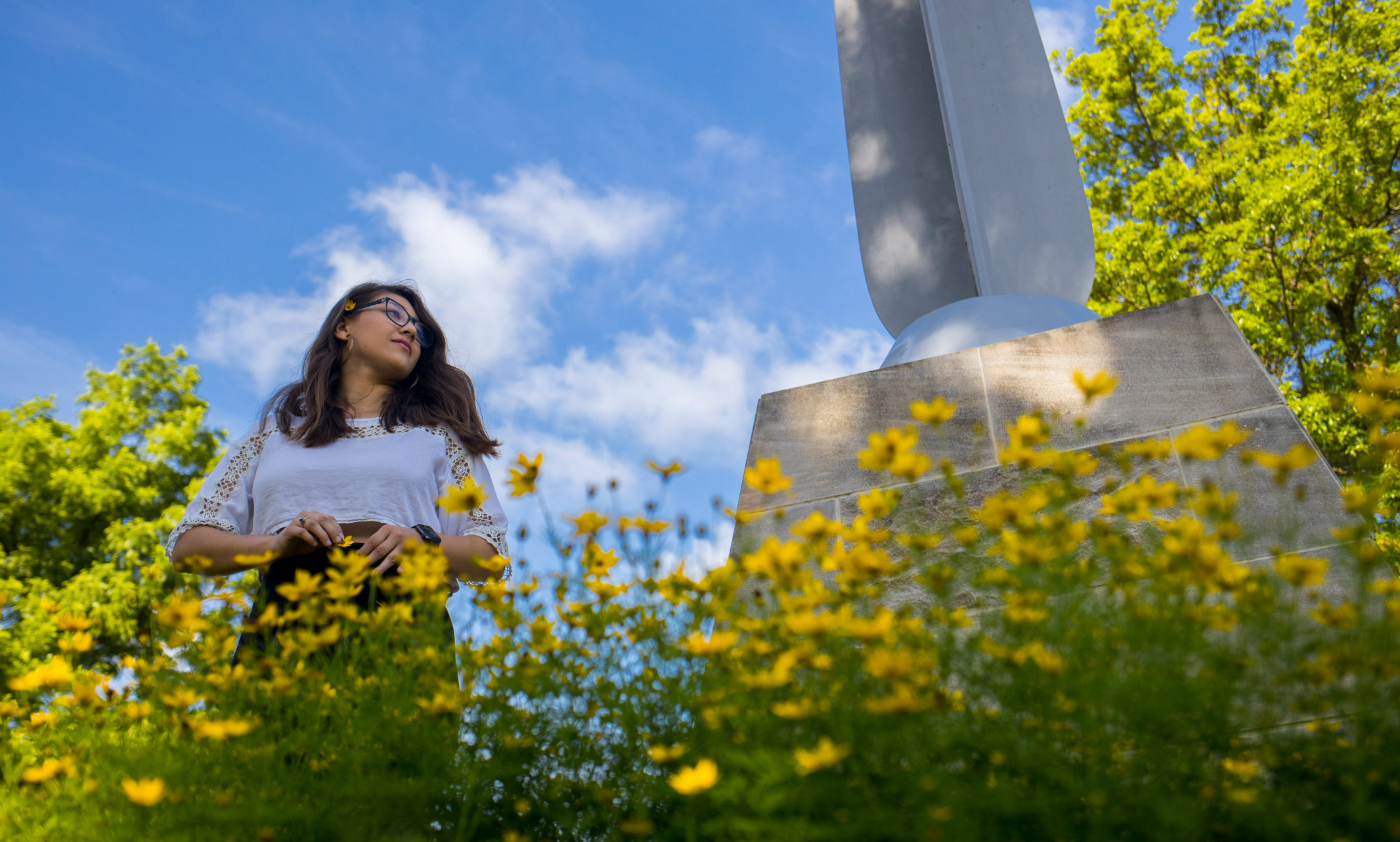
Student ambassadors take you on a quick tour
As campus ambassadors, we’re always showing prospective students all around UMKC. There are a ton of cool spots to snap a pic. Here are five of our favorites – all within about a short walk around the Volker Campus.
1. Miller Nichols Library and Learning Center
The library is a great place to hang out because not every place is a quiet spot, plus it’s super photogenic. The Minecraft-esque lime-green-and-emerald study area as you enter literally has us leaping for joy.
2. UMKC Student Union Rooftop
Of course we need to mention nearly every student’s favorite spot to hang when the weather’s still nice. There are lots of fun angles – whether you’re lounging atop or looking at it from afar.
3. Big Stairs on Oak Street
This pedestrian gateway to Volker Campus is one of the most defining features of UMKC. As you walk up — and up, and up — you’re surrounded by scenes of campus and Kansas City. Another bonus: you get a decent workout.
4. Archipenko Sculptures
Plenty of other colleges have typical, traditional columns, but few can claim a pair of funky abstract sculptures by the internationally-acclaimed Alexander Archipenko, who was an artist-in-residence at UMKC. Fun fact: the two painted, sheet-iron sculptures are actually identical — one is just rotated 90 degrees from the other to give the appearance of two different sculptures.
5. Epperson House
Everyone wants to go inside this 56-room Tudor-style mansion that was built in 1923, but it’s closed to the public until a future use of this turreted, brick building is determined. However, it’s definitely an interesting enough place to snap a selfie. The house’s claim to fame is that it’s reportedly haunted – boo!
Nov 18, 2019
News 3 Now and Channel 3000 in Wisconsin picked up a story from Matt Egan, CNN Business, about UMKC Alumna Mary Daly
Mary Daly earned her bachelor’s degree in 1985 in economics and philosophy from the University of Missouri-Kansas City. That’s when she achieved what she calls her “escape velocity.” A podcast interview by CNN’s Poppy Harlow is also available online. Read the Channel 3000 story.
Nov 16, 2019
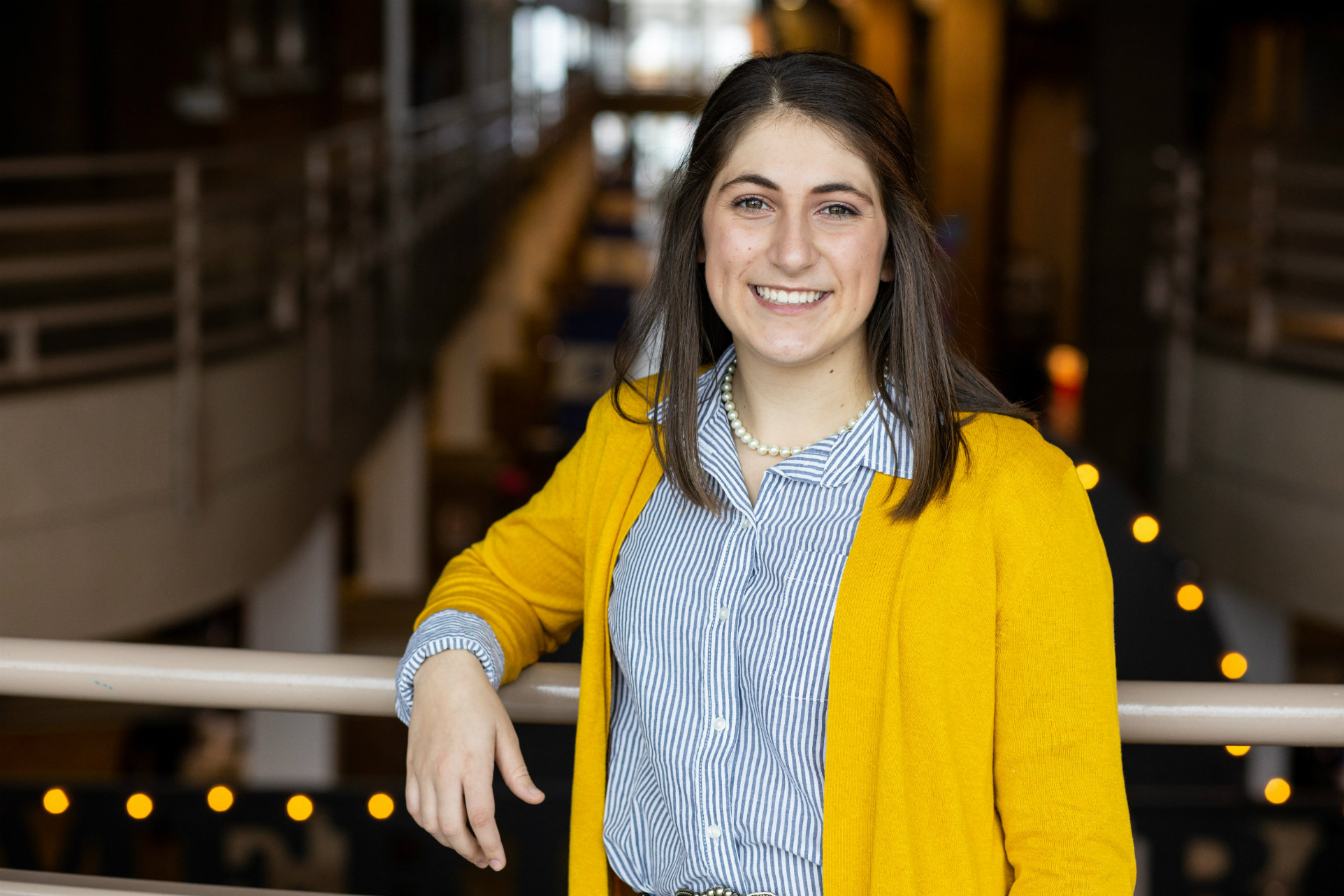
While Marlena Long grew up caring for livestock, her lifelong plan has been curing patients
Marlena Long '25Hometown: Paris, MissouriHigh School: Paris High SchoolDegree program: Six-year B.A./M.D.
Marlena Long has always loved science. But it was her exposure to life, death and medicine—through farm life and personal experiences—that led her to the six-year B.A./M.D. program at UMKC.
“My grandfather died when I was 7 years old. We would travel to the cancer center in Columbia, Missouri, and I would sit with my grandpa while he received chemotherapy treatments,” Long says. “I noticed how the doctors and nurses made my grandpa feel better, and I knew that I wanted to do that someday. Ever since then, I have dreamed of being a doctor.”
Long shadowed with a cardiologist while she was in high school. Just as the medical professionals who treated her grandfather influenced her, this experience further confirmed her interest in becoming a doctor.
"I have learned so much about myself in just the first month at UMKC. Now I know I have a very bright future in front of me if I continue to work hard." Marlena Long
Long completed her associate’s degree at Moberly Area Community College before coming to UMKC. She says the classroom experience gave her an idea of what to expect, but getting acclimated to college life has been different.
“The courses have been intense,” Long says. “I have been able to learn so much in my short time here due to my professors working so hard to make sure I understand what I need to for my future. But there are advantages, too. Not taking the MCAT decreased the time I need to receive my degree, and I’m able to start clinic work my first year.”
While Long is taking her studies seriously, she is also making the time to make connections.
“I didn’t know my roommate before school started, but we are close friends now. All my friends have different backgrounds, but I’m the only farm kid,” says Long, who grew up raising pigs and cattle on her family farm through 4-H and the National FFA Organization. “They are really curious about it. I’m planning a trip home with them this winter so that they can see the piglets that I’ll be showing next summer.”
While Long grew up exposed to the practice of animal medicine, she was never interested in being a veterinarian.
"The biggest advantage is understanding the circle of life."
“That seems like my parents’ life,” she says. “My mother works at BASF (a company that develops chemical products for agriculture with a focus on sustainability). She told me she may be able to help me get a job in that business. But I want to be a doctor.”
Regardless of her career choice, Long does value her experience growing up on a farm.
“There’s so much responsibility. When it’s snowing outside on Christmas morning, you still have to go outside and heat up the water for the animals to drink,” she says. “But the biggest advantage is understanding the circle of life. I’ve seen animals be born, do all the things they are supposed to do and then pass away. I learned that so early.”
Long showed her pigs at the American Royal this fall. She’s confident and comfortable moving through the rows and pens of the livestock. While she is very independent, she still visits home a lot and has one foot firmly on her home turf.
“I’m going to be a doctor, but I don’t think I’ll ever stop showing pigs.” Long smiles and nods slowly. “I mean, my kids will show pigs.”
Nov 14, 2019
From the Kansas City Business Journal: The UMKC Bloch School Entrepreneur of the Year awards program honors several entrepreneurs
The University of Missouri-Kansas City Regnier Institute for Entrepreneurship and Innovation is gave a nod to Cerner Corp. this year in the annual Entrepreneur of the Year awards program. Read more.
Nov 13, 2019
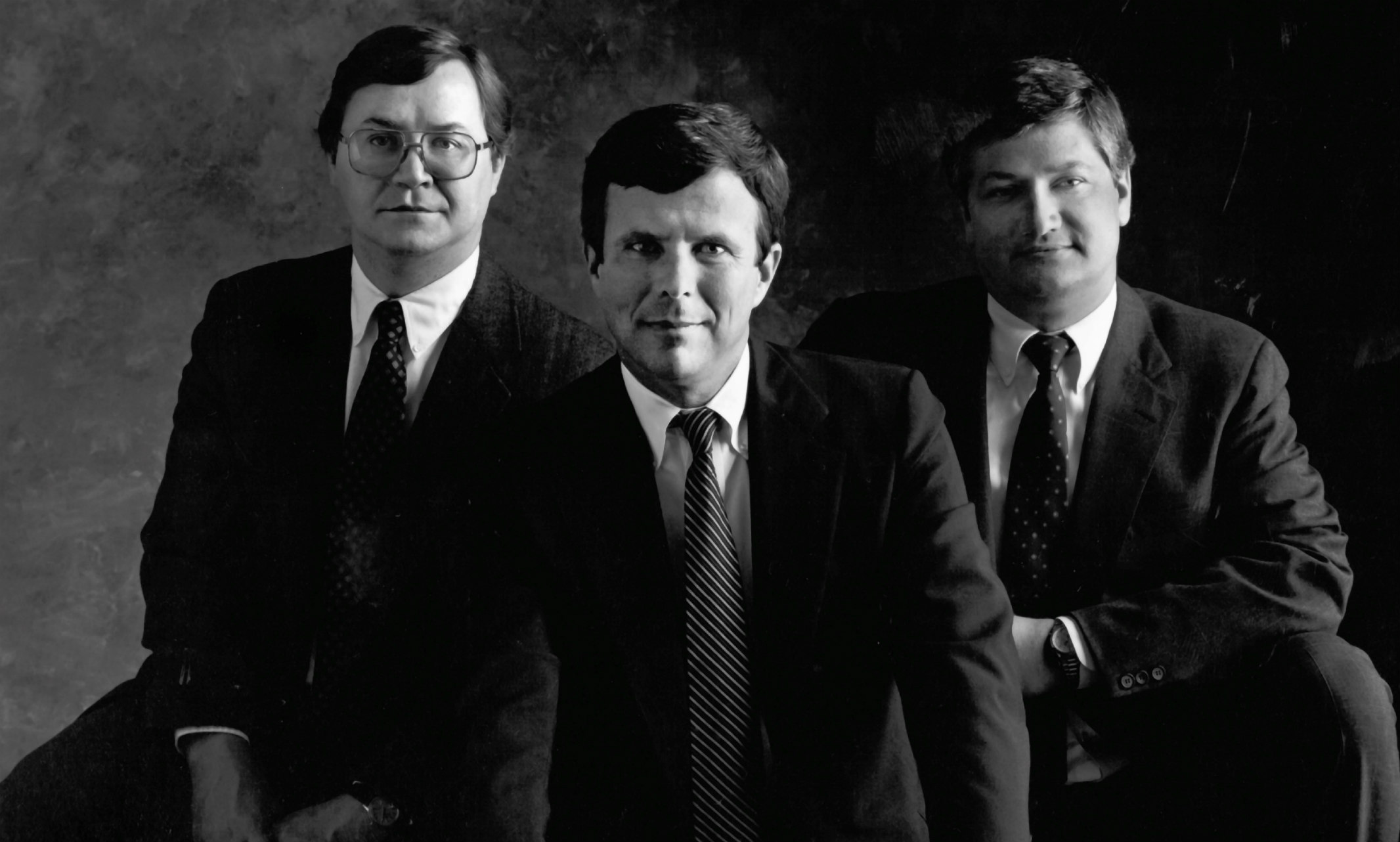
Cerner founders among UMKC honorees for 34th annual event
KANSAS CITY, Mo. – The University of Missouri-Kansas City has announced the honorees for its 34th Annual Entrepreneur of the Year awards. The celebration is sponsored by the Regnier Institute for Entrepreneurship and Innovation at the university’s Henry W. Bloch School of Management.
The event is Friday, Nov. 15 at Bloch Executive Hall, 5108 Cherry St., Kansas City, Missouri. A Venture Showcase and Reception begins at 5:30 p.m. with the awards program following at 7 p.m. Here is ticket and sponsorship information.
Past inductions for the Bloch School’s Entrepreneur Hall of Fame are included in the program.
"This year’s Entrepreneur of the Year Awards is particularly meaningful for us as we celebrate the lessons we learned from our friend, the late Henry Bloch; lessons that we are responsible to carry on and teach the next generation of young, ambitious entrepreneurs."
- Chancellor C. Mauli Agrawal
The Entrepreneur of the Year Awards event is an iconic Kansas City tradition started in 1985. Beyond its philanthropic cause, this event is a valuable forum where Kansas City CEOs, entrepreneurs, business owners, industry legends, world-class faculty and students alike are able to celebrate a common passion. The event celebrates entrepreneurial spirit and serves as a source of inspiration to future generations of innovative entrepreneurs.
All proceeds from this event directly benefit the Regnier Institute for Entrepreneurship and Innovation’s student and community programs. The Regnier Institute at the Bloch School focuses on connecting students and community members with a comprehensive combination of world-class research, renowned faculty, cutting-edge curriculum and experimental programs driven to deliver results and nurture the next generation of entrepreneurs.
Nov 12, 2019

Chancellor Agrawal and UM System launch initiatives to improve wellness
Chancellor Agrawal’s new initiative at the University of Missouri-Kansas City, Roos for Mental Health, is part of the university’s commitment to maintaining a culture of care.
Did you know that one in four adults will be affected by mental illness at some point in their lives? And that nearly two-thirds of people don’t seek treatment because of stigma, discrimination or lack of understanding?
Roos for Mental Health is aimed at reducing the stigma around mental illness, creating opportunities to enhance self-care for students, faculty and staff and offering education about the importance of nutrition, physical activity and communication.
“Seventy-five percent of serious adult mental illness starts by the age of 25 and these conditions are better managed when diagnosed and treated early on,” says Kathryn Brewer, visiting assistant professor and co-chair of Roos for Mental Health.
The initiative will kick off a year-long campaign during the Kansas City Roos men’s basketball game on Monday, Nov. 18, followed by activities throughout the week including a lunch-and-learn on Tuesday, Nov. 19, from noon–1 p.m. in Swinney Center. The topic will be how nutrition affects mental health. It is free to attend and open to students, faculty and staff. Sign-up through the IMLeagues website.
“The program wouldn’t be possible without the work and dedication of the staff, faculty and students who are volunteering their time to the committee and at events,” says Brewer.
In 2020, each month will focus on a related topic with corresponding events and resources.
January: Drugs and Alcohol
February: Eating Disorders
March: Self-Injury
April: Sexual Assault
May: Mental Health
June: PTSD
July: Grief and Loss
August: Happiness
September: Suicide
October: Domestic Violence
November: Depression
December: Stress and Anxiety
“We take a holistic approach when looking at mental health and wellbeing — not just in terms of counseling but also by looking at things like exercise, healthy sleep patterns, social support and other activities that contribute to a healthy and balanced life,” says Arnold Abels, director of Counseling, Health, Testing and Disability Services and co-chair of Roos for Mental Health.
“These initiatives will save lives. The incidence of mental health issues is on the rise for college students." —Kathryn Brewer, co-chair Roos for Mental Health
“We are working to better utilize our existing services and develop more proactive strategies to address the needs of students, faculty and staff,” says Brewer. “The Sanvello app is a good example of that.”
The Sanvello app offers on-demand help for stress, anxiety and depression. The University of Missouri System is making the app available for free to anyone who has a UMKC email address. Sanvello has a range of features including mood tracking, coping tools, guided journeys and community support to promote healthy habits and behaviors.
“These initiatives will save lives,” Brewer says. “The incidence of mental health issues is on the rise for college students. Through Roos for Mental Health we’ll provide the resources and support to help students on their path to mental health and wellness.”
Below are more resources available to UMKC students, faculty and staff.
Online Self-Help
UMKC Counseling offers to students, faculty and staff to promote mental health.
Personal counseling
Counseling Services provides several opportunities for students. Walk-in crisis hours for any student weekdays at 10 a.m. and 2 p.m. Most group meetings are available on-line and counseling appointments are telehealth as well. Mind Body Connection will be reopening with limited services as soon as student staff workers are hired.
Mind Over Mood
A three-week workshop focused on grief and anxiety. The counseling office is working to provide ADA- compatible transcripts and videos on the site as additional resources.
Campus Recreation
Fitness classes available on campus, Instagram stories and Esports including PS4 and X-Box Fifa and Madden
Disability Services is open from 8:30 a.m. to 5 p.m. Monday through Friday, but the office is encouraging virtual visits. To set up an Accommodations Plan or address questions about accommodated exams or notetaking, details are available on the site.
The Suicide Prevention Hotline is 1-800-273-8255 (TALK.)
Nov 11, 2019
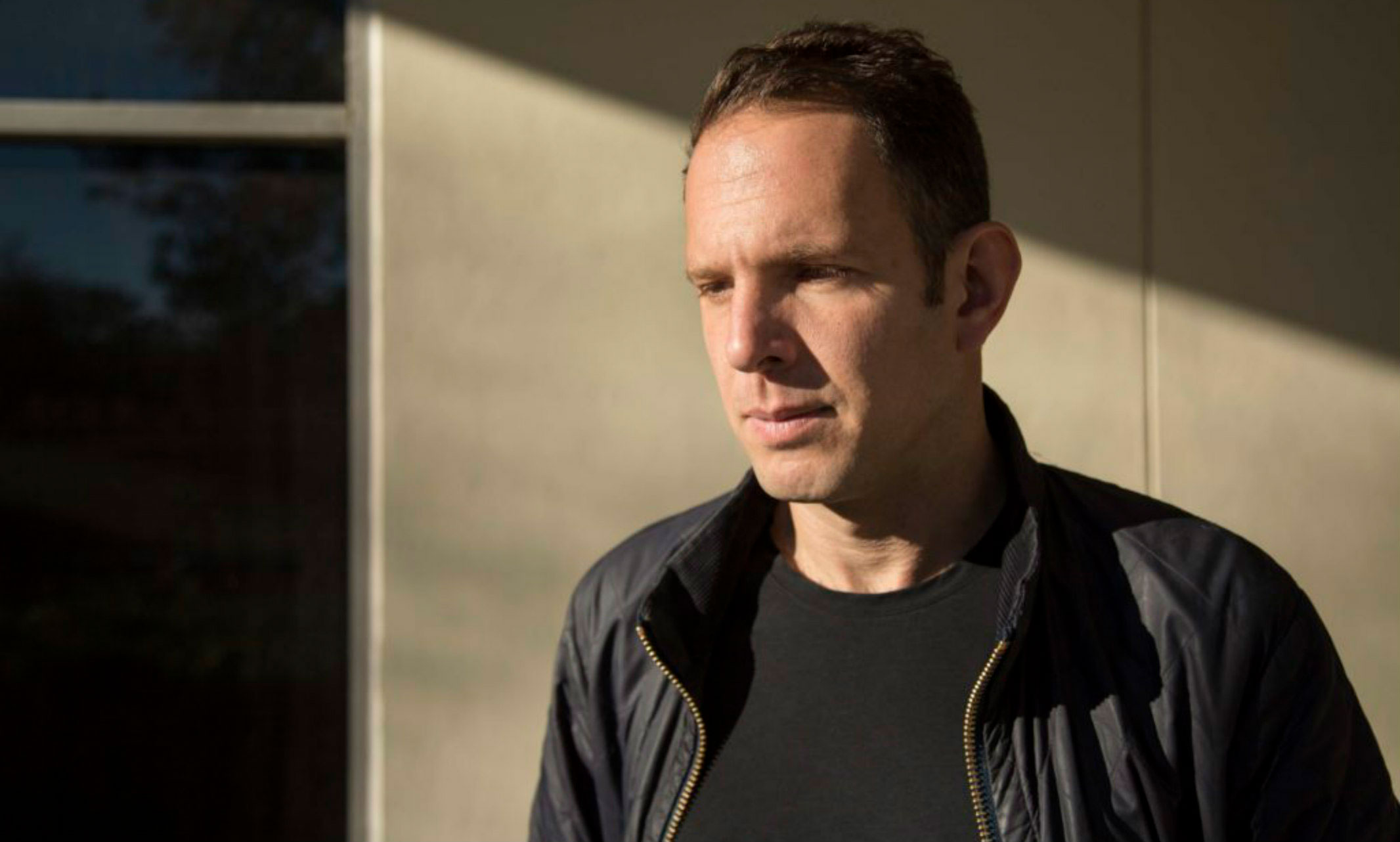
Conservatory's Yotam Haber is one of three winners of the 2020 Azrieli Music Prizes
The Conservatory is pleased to note that Associate Professor of Music Composition Yotam Haber is one of three winners of The Azrieli Foundation awards. Haber has won the Azrieli Commission for Jewish Music. Established in 2014, the biennial Azrieli Music Prizes offer opportunities for the discovery, creation, performance, and celebration of excellence in music composition.
The release notes, "The Azrieli Commission for Jewish Music is awarded to the composer who displays the utmost creativity, artistry, and musical excellence in proposing a response to the question – "What is Jewish music?" – in the shape of a musical work. 2020 Commission winner, Yotam Haber, has been awarded to write a new song cycle for voice and ensemble. His new work – Estro Poetico Armonico III – will continue baroque composer Benedetto Marcello's "telephone game" of hearing and re-hearing music he transcribed in a Venice Synagogue, and remembering and misremembering."
Nov 11, 2019
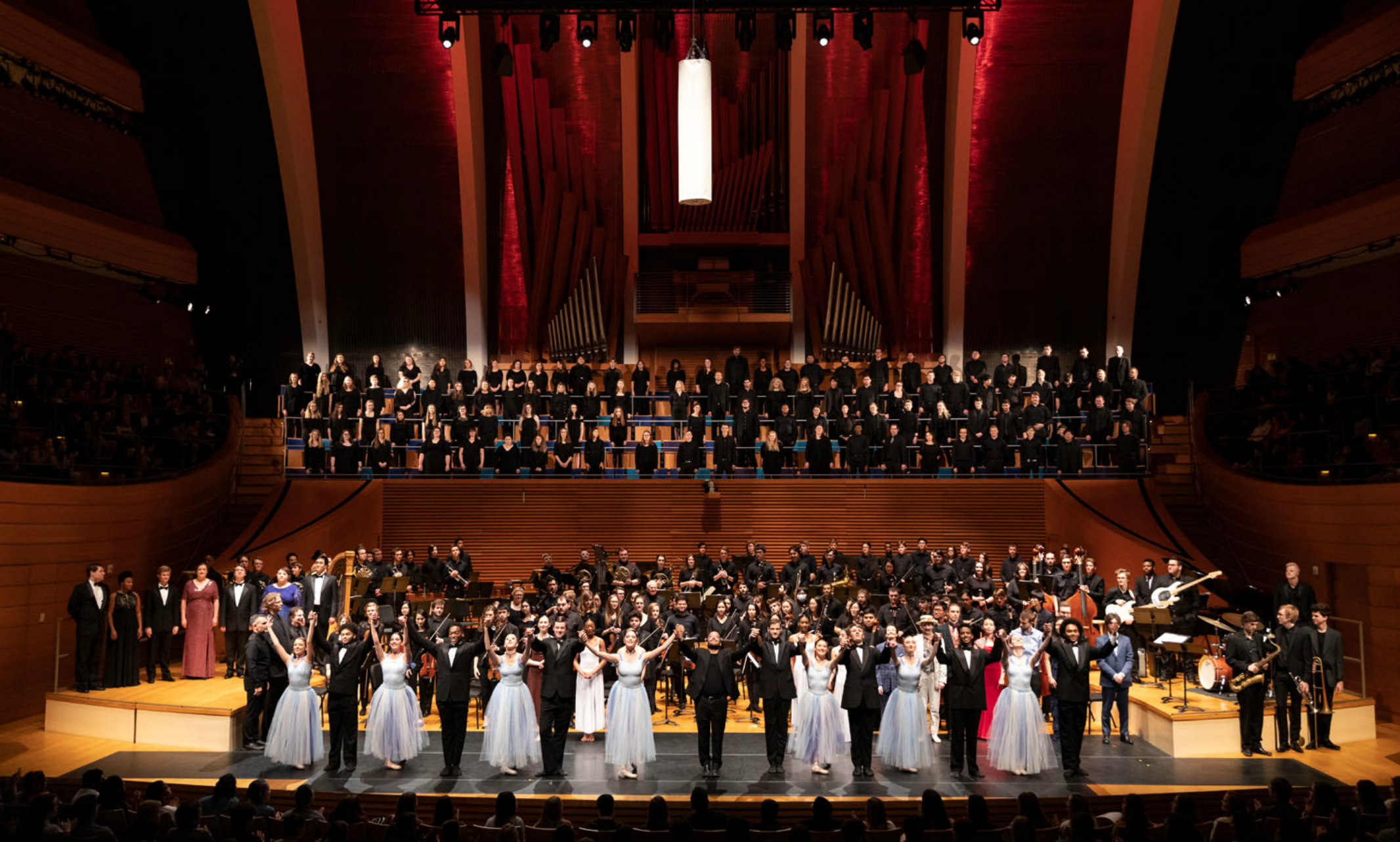
More than 300 students, faculty perform in annual concert
The talent of more than 300 University of Missouri-Kansas City Conservatory faculty and students was on display Nov. 8 at Crescendo.
Held in the stunning Helzberg Hall at the Kauffman Center for Performing Arts, Crescendo is the signature event for the UMKC Conservatory and a scholarship fundraiser for UMKC Conservatory students. This year’s gala and concert raised more than $600,000 as of event night and the total is expected to increase as donations continue to come in.
“Many of these young artists would not have the opportunity to pursue their dreams without your patronage,” said Conservatory Dean Diane Petrella before the concert. “Since moving Crescendo to the Kauffman Center in 2012, we have raised over $2.5 million in scholarship funds.”
In addition to raising scholarship dollars, this year’s Crescendo accepted donations to the Conservatory’s piano fund to improve the quality of the piano inventory. Pianos play a critical role in Conservatory programs. The average age of the current piano inventory is 42 years old, with the condition of these instruments deteriorating under the near constant use they are subjected to on a daily basis. Last June, The Richard J. Stern Foundation for the Arts generously awarded the Conservatory a $75,000 grant to use towards the purchase of new pianos. The Conservatory is currently in a campaign to match that grant by raising an additional $75,000 through private donations. The goal is to purchase a new concert grand piano for the White Recital Hall stage on the UMKC campus.
As Crescendo has also grown over the years, Petrella said they have actively sought ways to expand the impact of the performance. Three years ago, the Conservatory began hosting an annual special matinee performance, busing middle and high school students from all over the Kansas City area to the Kauffman Center. For many of the children, this was the first time they’ve experienced a performance of this caliber in a setting this spectacular.
“These performances not only support our efforts in community outreach, but also help us to connect with local talent to recruit the next generation of artists to the Conservatory,” Petrella said. This year, through grant and private funding, the Conservatory expanded this outreach to two performances, with more than 2,500 students attending matinees earlier in the day.
The fast-paced performance began with Masquerade (2013), Anna Clyne (b. 1980) trans. Dennis Llinás, performed by the Conservatory Wind Symphony, Professor Steven D. Davis, conductor. It was quickly followed by O Clap Your Hands (1920), Ralph Vaughan Williams (1872-958), sung by the Combined Choral Ensembles with Professor Charles Robinson as conductor.
UMKC piano students delighted the audience with Galop-marche á huit mains (1898), Albert Lavignac (1846-1916); followed by Libertango (1974), Astor Piazzolla (1921-1992) arr. Jeff Scott, performed by the UMKC Graduate Fellowship Woodwind Quintet and Professor Celeste Johnson as coach. UMKC Brass students also played “Nimrod” from Enigma Variations (1898-99), Edward Elgar (1857-1934).
The program then featured a scene from An Italian Straw Hat (1851), Eugene Labiche (1815-1888) Marc-Michel (1812-1868), and translated by Professor Felicia Londré.
The Conservatory Orchestra, with Conductor Professor Adam Boyles, performed Music to Shakespeare’s Romeo and Juliet (1947), David Diamond (1915-2005), 1. Overture. Allegro Maestoso.
The UMKC Jazz Combo entertained with Night and Day (1932), Cole Porter (1891-1964) arranged by Zak Jonas; followed by Precious Lord (1938/1996), Thomas A. Dorsey (1899-1933) arranged by Arnold Sevier, sung by Conservatory Singers and with Professor Eph Ehly as conductor.
Courtesy of Wylliams/Henry Contemporary Dance Company, the audience was tantalized by Sweet in the Morning (1992) with choreography by Leni Wylliams (1961-1996), music by Bobby McFerrin and restaged by Professor DeeAnna Hiett.
Wrapping another amazing year, Crescendo’s last performance was “Make Our Garden Grow” from Candide (1956), Leonard Bernstein (1918-1990), performed by the Conservatory Orchestra, Combined Choral Ensembles and Professor Adam Boyles as conductor.
The 2019 Crescendo honorary co-chairs were Julie Quinn and Teri Miller; and Mark Sappington and David McGee. Co-Chairs were Marylou Turner and Michael Henry.
Nov 11, 2019
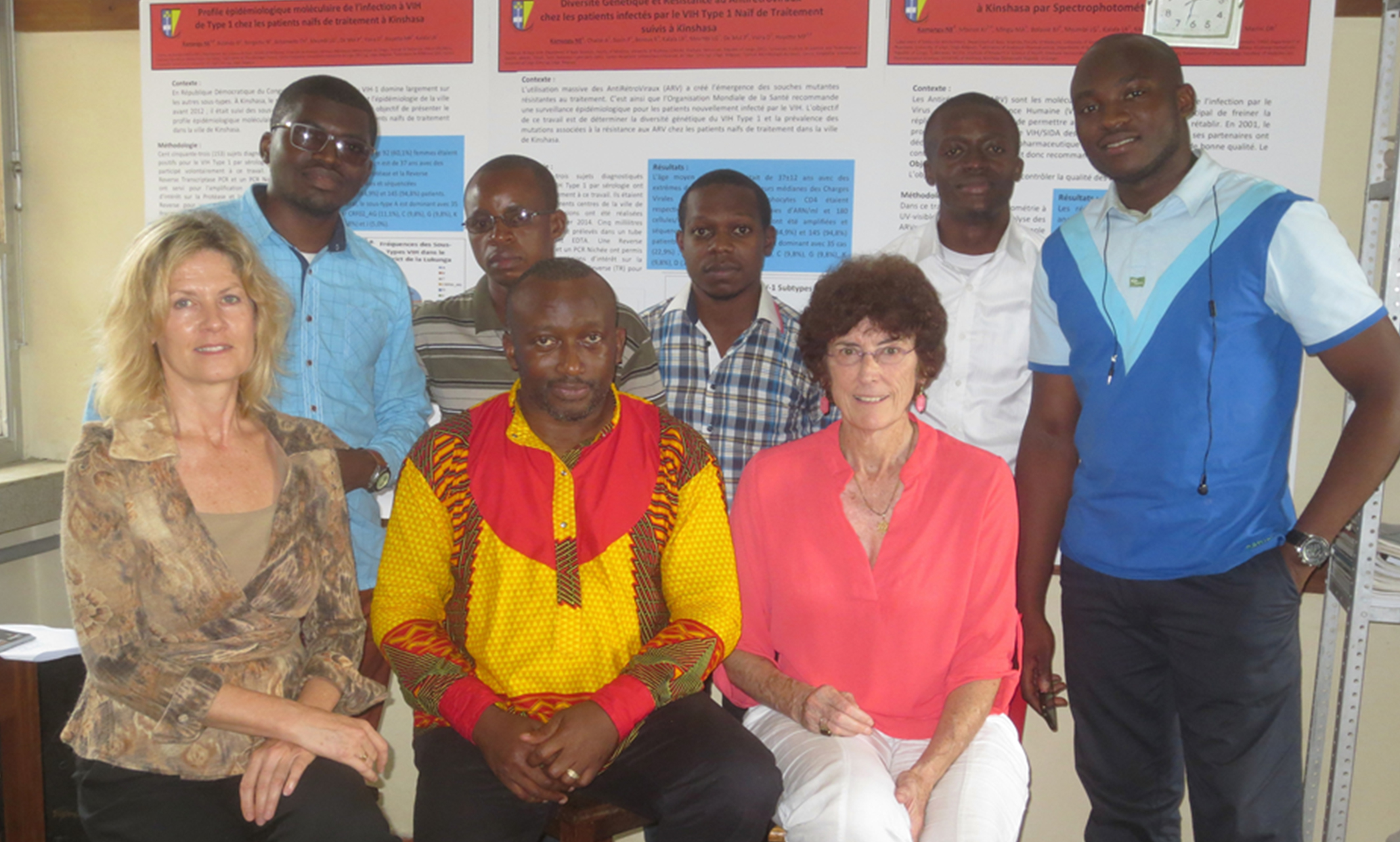
First time a new subtype of HIV-1 has been discovered since 2000
Carole McArthur, M.D. '91, Ph.D., of the UMKC School of Dentistry and UMKC School of Medicine, was part of a team of scientists who discovered a new strain of HIV.
The new subtype is referred to as HIV-1 Group M, subtype L—and is part of the Group M viruses that are responsible for the global pandemic, which can be traced back to the Democratic Republic of Congo.
"In an increasingly connected world, we can no longer think of viruses being contained to one location," said McArthur, one of the study authors. "This discovery reminds us that to end the HIV pandemic, we must continue to outthink this continuously changing virus and use the latest advancements in technology and resources to monitor its evolution."
In order to determine whether an unusual virus is a new HIV subtype, three cases have to be discovered independently. The first two for this subtype was discovered in 1980s and 1990s and this third was collected in 2001 but difficult to sequence until now.
Today, technology allows researchers to build entire genomes at higher speeds and partnering scientists at Abbott had to develop new techniques in order to confirm the discovery.
“This discovery reminds us that to end the HIV pandemic, we must continue to outthink this continuously changing virus and use the latest advancements in technology and resources to monitor its evolution.” – Carole McArthur, M.D., Ph.D.
Mary Rodgers, Ph.D., one of the Abbott scientists who co-authored the study with McArthur, said identifying viruses like this one are like searching for a needle in a haystack; however, with new technologies it feels as though they are now “pulling the needle out with a magnet.”
“This scientific discovery can help us ensure we are stopping new pandemics in their tracks," she said.
Abbott’s Global Viral Surveillance Program monitors HIV and hepatitis viruses, specifically, to ensure the company’s diagnostic tests remain up to date. And now that this new strain has been identified, they are able to detect it.
You can read the full release here.
The study was published in the Journal of Acquired Immune Deficiency Syndromes (JAIDS).
In the News
Hundreds of outlets around the world published this discovery, including:
CNN
Daily Mail
Forbes
Kansas City Business Journal
MSNBC
Newsweek
USA Today
Nov 08, 2019
New location places Regnier Institute entrepreneurship facility at heart of KC startup community
The Bloch VentureHub will join entrepreneurs from across Kansas City at Plexpod Westport Commons with permanent office space in the giant co-working building. The redesigned VentureHub will feature mentors on site, a resource library and open co-working hours for students and entrepreneurs.
The Regnier Institute for Entrepreneurship and Innovation, a program of the Henry W. Bloch School of Management at the University of Missouri-Kansas City, announced a multi-year agreement this fall with Plexpod. The Plexpod Westport Commons in Midtown Kansas City will be the new home of the Bloch VentureHub, which has moved from its previous location at 43rd and Madison streets.
The historic Plexpod building once housed Westport Junior High School. A 2017 renovation transformed the 1923 structure into one of the world’s largest co-working communities, meshing a modern office space with eclectic whispers from the building’s past such as restored hardwood floors, metal lockers and a historic 600-person theater.
The Bloch VentureHub plans to offer Coworking Wednesdays where enrollees in the Institute’s Entrepreneurship Scholars program, program alumni, UMKC students and other entrepreneurs can work in the space and enjoy the benefit of Institute mentors on site and a resource library. The move to Plexpod puts the VentureHub on a purposeful collision path with entrepreneurs in Kansas City.
“The mission of the Regnier Institute is to take entrepreneurship beyond the classroom. This is a deliberate step to offer RIEI resources to the community,” said Andy Heise, assistant director.
In addition to housing active ventures, Plexpod hosts One Million Cups and community events. The building offers a rooftop deck with 360 degree views of Kansas City, a gourmet café, boardrooms, meeting rooms, and creative space – all intriguing options for hosting future Regnier Institute programs and events on key topics such as ideation, modeling, scaling the venture, and business basics in close proximity to entrepreneurs who can put the information to use.
The VentureHub’s new home places the Regnier Institute in the center of Kansas City’s entrepreneurial ecosystem. Institute Managing Director for Venture Creation Bryan Boots oversaw the development of the agreement and said, “Being here will help the Regnier Institute stay close to the pulse of entrepreneurship communities.”
Along with this new Plexpod annex, the Regnier Institute for Entrepreneurship and Innovation will maintain its core offices in Bloch Executive Hall on the UMKC campus.
The Regnier Institute for Entrepreneurship and Innovation (RIEI) inspires and nurtures entrepreneurs and innovators through transformational education, research, and programs. RIEI offers formal entrepreneurship education to enrolled students at the University of Missouri-Kansas City and provides educational opportunities for members of the community who are looking for guidance and support as they prepare to launch new ventures. RIEI programs are designed to advance entrepreneurship and innovation across the University of Missouri-Kansas City campus, locally in the Kansas City region, and around the world.
Nov 07, 2019
The Bloch VentureHub's move to Plexpod Westport Commons was recently featured in the Kansas City Business Journal
The Bloch VentureHub, a program of the UMKC Henry W. Bloch School of Management, will get a new home in Plexpod Westport Commons. Read the story and view the photos.
Nov 07, 2019
CNN and a number of news outlets wrote about the research, co-authored by Carole McArthur at UMKC
“This discovery reminds us that to end the HIV pandemic, we must continue to out think this continuously changing virus and use the latest advancements in technology and resources to monitor its evolution,” study co-author, Carole McArthur, a professor in the department of oral and craniofacial sciences at the University of Missouri-Kansas City, said in a statement. Read more.
Nov 06, 2019
